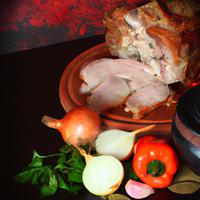
1 serving (100 grams) contains 242 calories, 27.3 grams of protein, 13.9 grams of fat, and 0.0 grams of carbohydrates.

Log this food in SnapCalorie

Nutrition Information
Calories |
576.2 | ||
|---|---|---|---|
% Daily Value* |
|||
| Total Fat | 33.1 g | 42% | |
| Saturated Fat | 11.4 g | 57% | |
| Polyunsaturated Fat | 0 g | ||
| Cholesterol | 200 mg | 66% | |
| Sodium | 147.6 mg | 6% | |
| Total Carbohydrates | 0 g | 0% | |
| Dietary Fiber | 0 g | 0% | |
| Sugars | 0 g | ||
| protein | 65 g | 130% | |
| Vitamin D | 0 mcg | 0% | |
| Calcium | 45.2 mg | 3% | |
| Iron | 2.6 mg | 14% | |
| Potassium | 1007.1 mg | 21% | |
* Percent Daily Values are based on a 2,000 calorie diet. Your daily values may be higher or lower depending on your calorie needs.
Food Attributes
Source of Calories
About Cooked boiled pork
Cooked boiled pork is a simple yet versatile dish featuring pork cooked in water or broth until tender. Commonly prepared in cuisines across the globe, this cooking method is especially popular in Asian and European dishes, where pork is often seasoned or served with accompanying sauces. Boiling pork allows it to retain moisture and develop a delicate texture. Nutritionally, boiled pork contains high-quality protein, essential for muscle growth and repair, as well as key vitamins like B12 and minerals such as zinc and iron. However, its health profile depends on factors like the cut of meat, portion size, and added seasonings. While lean cuts of pork can be heart-healthy, fattier cuts are higher in saturated fats, which should be consumed in moderation. Pairing boiled pork with nutrient-rich vegetables and whole grains can create a well-balanced meal that supports overall health.



